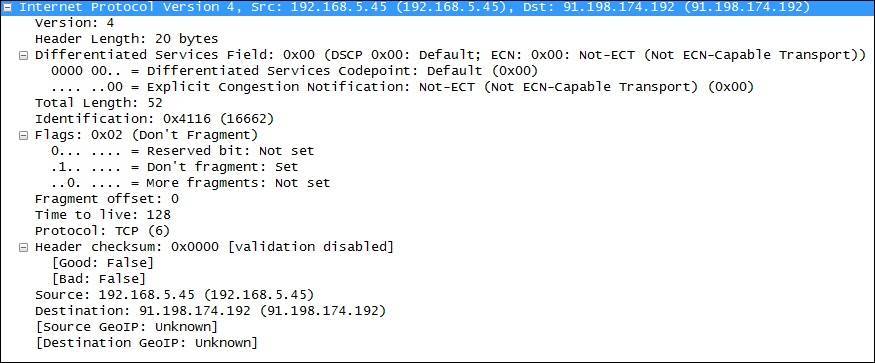An IP header is a prefix to an IP packet that contains information about the IP version, length of the packet, source and destination IP addresses, etc. It consists of the following fields:
Here is a description of each field:
- Version – the version of the IP protocol. For IPv4, this field has a value of 4.
- Header length – the length of the header in 32-bit words. The minumum value is 20 bytes, and the maximum value is 60 bytes.
- Priority and Type of Service – specifies how the datagram should be handled. The first 3 bits are the priority bits.
- Total length – the length of the entire packet (header + data). The minimum length is 20 bytes, and the maximum is 65,535 bytes.
- Identification – used to differentiate fragmented packets from different datagrams.
- Flags – used to control or identify fragments.
- Fragmented offset – used for fragmentation and reassembly if the packet is too large to put in a frame.
- Time to live – limits a datagram’s lifetime. If the packet doesn’t get to its destination before the TTL expires, it is discarded.
- Protocol – defines the protocol used in the data portion of the IP datagram. For example, TCP is represented by the number 6 and UDP by 17.
- Header checksum – used for error-checking of the header. If a packet arrives at a router and the router calculates a different checksum than the one specified in this field, the packet will be discarded.
- Source IP address – the IP address of the host that sent the packet.
- Destination IP address – the IP address of the host that should receive the packet.
- Options – used for network testing, debugging, security, and more. This field is usually empty.
Consider the following IP header, captured with Wireshark:
Notice the fields in the header: the IP version is IPv4, the header length is 20 bytes, the upper-level protocol used is TCP, the TTL value is set tu 128, source and destination IP addresses are listed, etc.
Download our Free CCNA Study Guide PDF for complete notes on all the CCNA 200-301 exam topics in one book.
We recommend the Cisco CCNA Gold Bootcamp as your main CCNA training course. It’s the highest rated Cisco course online with an average rating of 4.8 from over 30,000 public reviews and is the gold standard in CCNA training:


